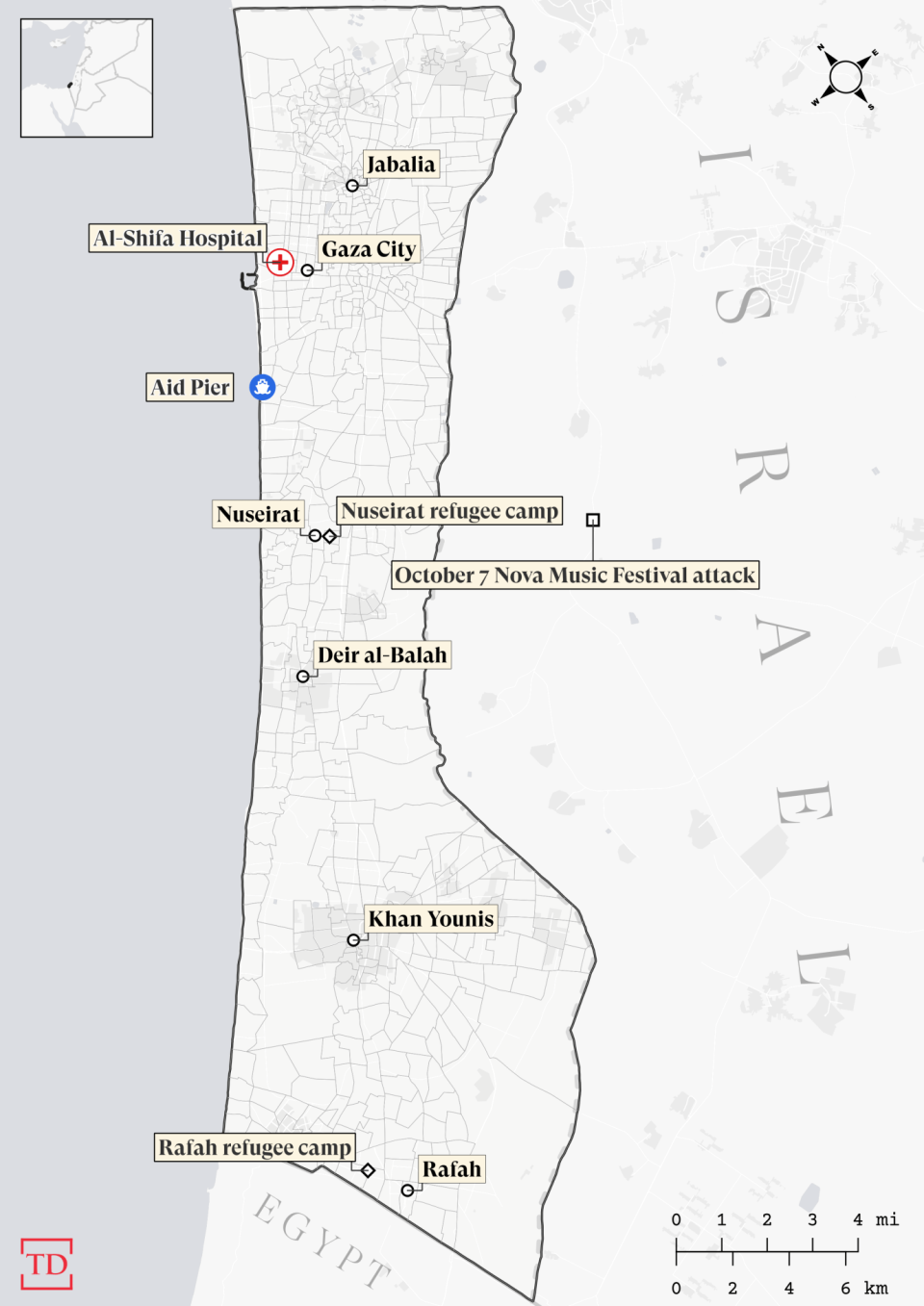Israel Rescues Four Hamas-Held Hostages from Gaza
- Oops!Something went wrong.Please try again later.
- Oops!Something went wrong.Please try again later.
- Oops!Something went wrong.Please try again later.
From the The Morning Dispatch on The Dispatch

Happy Tuesday! We can see that some of you tech whizzes have already figured this out on your own, but commenting avatars are officially available again! Click the red “My Account” button in the top-right corner of the website, navigate to the “Commenting Preferences” tab, and upload a picture.
Newsletters and articles with three or more authors now also include the Oxford comma in the byline, but we’re guessing that our editors care much more about that bug fix than you do.
Quick Hits: Today’s Top Stories
Ukrainian military leaders announced Sunday the country’s forces had destroyed one of Russia’s most valuable and advanced fighter jets in a targeted drone strike in the region of Astrakhan, deep within Russian territory near the Caspian Sea. If confirmed, the attack would mark the first time Ukraine has destroyed a Sukhoi Su-57 fighter jet—made operational in 2020 and nicknamed “Felon” by NATO. Ukrainian officials backed up claims of the strike with satellite images of a soot-marked airfield, and a Ukrainian military intelligence spokesman later claimed two of the jets had been damaged, and Russian personnel wounded.
The United Nations World Food Programme (WFP) temporarily suspended food distribution services from the U.S.-built pier in Gaza on Sunday, citing safety concerns after rockets struck two WFP warehouses on Saturday. “I’m concerned about the safety of our people after the incidents yesterday,” Cindy McCain, the organization’s executive director, said Sunday. “We’ve stepped back just for the moment to make sure that we’re on safe terms and on safe ground before we’ll restart.” It is unclear how long the pause will last, but McCain added that other WFP programs in the country remain operational. The source of the rocket fire Saturday was unclear, but the Israel Defense Forces—active in central Gaza on Saturday during a raid that rescued four Hamas-held hostages—said it was looking into the rocket strikes.
The United Nations Security Council on Monday passed a resolution on the ceasefire plan President Joe Biden originally proposed late last month, which U.S. Ambassador to the U.N. Linda Thomas-Greenfield said Israel had endorsed. Meanwhile, Secretary of State Antony Blinken traveled to the Middle East on Monday—his eighth trip to the region since October 7—to urge mediators to press Hamas to sign onto the Biden-advanced, three-phase ceasefire plan from Israel. “My message to governments throughout the region, to people throughout the region, is if you want a ceasefire, press Hamas to say yes,” Blinken said as he left Egypt on Monday. He also met with Israeli Prime Minister Benjamin Netanyahu in Israel, where the two discussed plans for a post-war Gaza.
A report from a Canadian national security parliamentary committee released last week found that some unnamed members of the country’s parliament were “semi-witting or witting” participants in foreign countries’ attempts to interfere in its 2019 and 2021 elections. The heavily redacted 92-page report alleged that members accepted money from unnamed foreign officials or proxies “knowingly or through willful blindness” and gave them “privileged information … knowing that such information will be used by those officials to inappropriately pressure Parliamentarians to change their positions.” The report points to China and India as posing the largest threats of foreign interference.
Malawian Vice President Saulos Chilima and nine other people are missing after their military airplane “went off the radar” on Monday and never landed at its intended destination of Mzuzu International Airport in the east African nation. Chilima and the others departed Malawi’s capital city, Lilongwe, early Monday morning for what was supposed to be a 45-minute flight before the plane became untraceable and unresponsive. Malawian President Lazarus Chakwera, who canceled a diplomatic trip to the Bahamas this morning after learning of Chilima’s disappearance, said Monday a search-and-rescue operation is underway.
The jury in Hunter Biden’s trial on federal gun charges began deliberations on Monday afternoon, following closing arguments from the defense and prosecution earlier in the day. The president’s son faces three federal felony charges stemming from allegations he lied about his drug addiction on federal forms and to a federally licensed firearms dealer with the intent of purchasing a gun—charges that carry a maximum sentence of 25 years in prison.
The Biden administration announced on Monday the creation of a multi-agency task force—including agents from the Bureau of Alcohol, Tobacco, Firearms and Explosives; the U.S. Marshals Service; the Federal Trade Commission; and the U.S. Postal Service—to combat the illegal sale of e-cigarettes and nicotine-vape products in an effort to reduce nicotine addiction in young Americans. “Unauthorized e-cigarettes and vaping products continue to jeopardize the health of Americans—particularly children and adolescents,” Benjamin Mizer, acting associate attorney general, said in a statement. “The establishment of this Task Force makes clear that vigorous enforcement of the tobacco laws is a government-wide priority.”
Democratic Sen. John Fetterman and his wife Gisele were in a two-car accident in Maryland on Sunday, his office said yesterday. Fetterman is being treated for a bruised shoulder after his car struck a Chevy Impala, but posted a video of himself and his wife last night saying they are “doing well” and back home. State police did not issue a citation at the time of the accident but said an investigation is ongoing.
Judge Aileen Cannon—the federal judge overseeing special counsel Jack Smith’s case against former President Donald Trump for allegedly retaining classified documents—rejected the Trump team’s motions to dismiss certain charges in the case on Monday, but did strike down a small part of Smith’s indictment. Cannon ordered prosecutors to strike an episode in the indictment that describes Trump showing a classified map to an adviser in September 2021. In her order, she held that the event was not relevant to the charges in the indictment, which are for retaining classified information, not illegally transmitting it.
Apple held its annual Worldwide Developers Conference on Monday, announcing a number of new, artificial intelligence-infused software updates that will be rolled out to iPhones, iPads, and Macbooks in the coming months. Among them: a new Apple Intelligence AI system, OpenAI’s ChatGPT being incorporated into Siri’s functionality, the Mail and iMessage apps offering AI summaries of long messages, and much more.
A Sabbath Hostage Rescue

The news spread almost instantaneously through much of Israel early Saturday afternoon: In a daring daytime raid, an elite team of Israel Defense Forces (IDF) troops, the Israeli police, and Shin Bet—the Israeli security service—had rescued four Hamas-held hostages from captivity in central Gaza.
Images ping-ponged across social media of the four Israelis—Noa Argamani, 26; Almog Meir Jan, 22; Andrey Kozlov, 27; and Shlomi Ziv, 41—reuniting with their family and friends and, at least in Argamani’s case, drinking her first Coca-Cola after eight months of Hamas captivity. Across the country, Israelis celebrated, from beaches where a lifeguard announced the successful rescue to city streets where people spontaneously paraded through neighborhoods waving Israeli flags.
But for many other Israelis, the day was passing as a Saturday normally does: without access to phones or other technology in observance of the Jewish Sabbath. But after 246 days waiting on the hostages’ return, one more day was one too many to wait to share the good news. Handwritten signs cropped up in observant communities, informing Sabbath-keeping neighbors of the rescue. “Enjoy the rest of your Sabbath,” one sign read after a note about the four rescued hostages.
The weekend’s surprising raid—details of which are still somewhat hazy as the fog of war lifts—briefly forestalled an entirely unsurprising political announcement: that centrist party leader Benny Gantz was leaving Prime Minister Benjamin Netanyahu’s War Cabinet. Gantz’s Sunday pronouncement will likely deepen Bibi’s reliance on his far-right flank as the rescue brings the question of a broader hostage deal back to the fore.
At 11 a.m. local time on Saturday morning, Israeli special forces conducted what IDF spokesman Daniel Hagari called a “high-risk, complex mission based on precise intelligence”—which the U.S. reportedly helped Israel collect—to rescue four hostages who were abducted from the Nova music festival on October 7 and being held in two separate apartment buildings in the built-up Nuseirat refugee camp in central Gaza. A video of Argamani pleading for her life as Hamas terrorists dragged her away from her boyfriend—whose whereabouts are still unknown—became a symbol of the horrors of the Hamas attack.

Argamani was moved through several apartments in Gaza with other hostages during her time in captivity, she said, but was being held by herself in a Palestinian family’s apartment at the time of the raid. On Saturday, Israeli forces overwhelmed the armed terrorists guarding her as she was washing dishes for her captors. “At first, I thought they were making fun of me,” she said of the IDF troops announcing themselves. “And I didn’t move. But then he asked me, ‘Can I throw you over my shoulder?’ and I realized what was happening.”
The mission to rescue the three male hostages was not so straightforward. As IDF body-cam footage showed, terrorists fired on the Israeli forces as they attempted to retrieve the three hostages sheltering in a room together in the home of Hamas terrorist Abdallah Aljamal—a one-time contributor to Al Jazeera and the U.S.-based nonprofit, the Palestine Chronicle—who was killed in the raid along with his wife and father. “We came to save you,” one Israeli troop says to the hostages who were visibly flinching at the sound of gunfire. “Stay calm.” The soldier then offers a reassuring fist bump.
As the gun fight expanded, IDF ground troops deployed and the Israeli air force began bombarding the areas from which Hamas fighters targeted the retreating Israeli forces and hostages. The truck carrying the three male hostages to the helicopter reportedly broke down after being shot at by Hamas operatives, forcing the troops to switch vehicles with the hostages while under heavy fire. A police commander, Arnon Zamora, died later on Saturday from wounds suffered in the firefight—and the mission was later renamed “Operation Arnon.”
The Hamas-run Gaza Health Ministry—which an Associated Press report recently found is overstating the number of women and children killed in Gaza during the war—claimed at least 210 Palestinians were killed in the gunfight and air strikes that ensued when Hamas fired on the troops and hostages. Hagari, the IDF spokesman, said that number was under 100. “I don’t know how many from them are terrorists,” he told reporters.
As our old friend David French explained, the terrorist organization has committed grave war crimes—practically guaranteeing civilian casualties—at every turn. “When Hamas took hostages, it committed war crimes,” he posted on Threads. “When it hid the hostages amongst civilians, it committed more war crimes. When its fighters fight IDF soldiers still wearing civilian clothes (making it harder to distinguish civilians and terrorists), it commits still more war crimes.”
The hostages remain in the hospital in Israel, and though early reports indicate they are malnourished, their ultimate physical and psychological conditions—and the details of their time in captivity—are still unclear.
Hamas still holds an estimated 120 hostages, living and dead, and may change its tactics for hiding them, now that seven total have been rescued from above-ground apartments. Intelligence-gathering on the hostages’ locations is difficult and rescue operations like last weekend’s are extremely rare—making it unlikely such missions could successfully retrieve all the remaining Israelis and, indeed, Americans, still in captivity. Hamas has routinely rejected ceasefire agreements that would free the hostages—their most important bargaining chip—including the most recent U.S.-backed, three-stage plan that reporting indicates was originally proposed by Israel.
Netanyahu’s government and War Cabinet have been divided for months over whether it is better to pursue the war to the bitter end—whatever that means—and put less emphasis on the return of all the hostages, or to strike some—also undefined—ceasefire-for-hostages deal with Hamas to secure the hostages’ return. And as Charlotte explained further in a piece on the site today, two of the far-right party leaders in Netayahu’s government, Minister of National Security Itamar Ben-Gvir and Minister of Finance Bezalel Smotrich, have threatened to pull out of the governing coalition if Bibi cuts a deal.
War Cabinet member and centrist party leader Benny Gantz—who favors a hostage deal with Hamas—last month gave Bibi an ultimatum, insisting the War Cabinet approve a plan for the war before June 8, Saturday, or Gantz would step down. No such plan materialized, and though Saturday’s rescue delayed Gantz’s resignation, it did not prevent it entirely. “Strategic and fateful decisions are made by the government out of political considerations,” Gantz said Sunday, accusing Netanyahu of “preventing us from achieving real victory.” He also called for new elections.
Amid Israel’s governmental chaos, U.S. Secretary of State Antony Blinken was in the Middle East this week, making his eighth visit since October 7. Leaving Egypt for Israel on Monday, he articulated the ultimate problem: Hamas’ intransigence. “My message to governments throughout the region, to people throughout the region,” he said, “is if you want a ceasefire, press Hamas to say yes.”
But for Almog Meir Jan, who had 246 days stolen from him by the terrorist group, it was already too late to fully recover his former life: His father died, seemingly of a heart attack, just hours before Meir Jan set foot back on Israeli soil. “My brother died of grief and didn’t get to see his son return,” Meir Jan’s aunt, Dina Jan, said. “The night before Almog’s return, my brother’s heart stopped.”
Worth Your Time
Higher education institutions—including many Ivy League schools—have reinstated standardized testing requirements and moved away from diversity, equity, and inclusion (DEI) programs—but not before they did serious damage to their reputations as purveyors of truth. “It’s amazing to watch such an abrupt volte-face,” Megan McArdle wrote in the Washington Post. “What’s even more amazing is how far things went beforehand and how long the correction took to arrive. … See how the Harvard admissions officers who, forbidden to forthrightly cap the number of White and Asian students, instead insisted that Asian applicants deserve lower personal ratings than other candidates. Most of the obfuscations are not this offensive, but they are all corrosive, and the thicker they’re slathered on, the more they weaken the underlying institution. … All this comes at a heavy cost, both internally, as it becomes harder to do good work in any area where it’s dangerous to find the wrong answer, and externally, as the public loses trust in the entire enterprise. It is good for our elite institutions, and for us, that they are trying to pull themselves back from the brink. A strong society requires strong truth-seeking institutions—and strong truth-telling ones, too.”
What is artificial intelligence going to do to music? “Just as The Bomb reshaped all of warfare, we’ve reached the point where AI is going to reshape all of music,” James O’Malley argued in Persuasion about Suno, an AI tool that can create original—if still mediocre—music from a user-inputed prompt. “If this was the limit of AI capabilities there wouldn’t be many reasons for ‘real’ musicians to lose any sleep over it. But remember the complaints that the first AI image generators couldn’t get the number of fingers right? Or that the first deepfakes wouldn’t blink? We don’t hear those complaints any more because the technology very rapidly improved. And there is every reason to believe the same is going to happen to AI-generated music. … However, I do think there are reasons to be optimistic about the future of music. Because the AI tools are also exciting. … When the AI era properly begins, it might not all be bad. We might start to hear things we’ve never heard before. And won’t that be … good … for human creativity?” We highly recommend taking a listen to the AI-generated song at the end of the article.
Presented Without Comment
BBC: YouTube Prankster Voted in as Cyprus [Member of European Parliament]
Also Presented Without Comment
Reason: Texas Public Library Can’t Remove Books About ‘Butts and Farts,’ Federal Court Rules
Also Also Presented Without Comment
New York Times: FDA Warns Against ‘Microdosing’ Mushroom Chocolate Bars Linked to Severe Illnesses
In the Zeitgeist
Scholastic announced late last week that Suzanne Collins will return to her Hunger Games series, publishing a new novel next March—15 years after the final installment was published in the original trilogy about a dystopian U.S. society in which children fight to the death.
The new novel will be the second book in Collins’ prequel series, and Lionsgate will produce the film adaptation scheduled for release in November 2026. Seems like a good time to rewatch all the films from the beginning and wonder again why we weren’t more alarmed that these terrifying—if entertaining—books and films were made for 12-year-olds:
Toeing the Company Line
In the newsletters: Kevin explored (🔒) what conservatism has to do with risk aversion, the Dispatch Politics crew took a look at how the Federal Reserve’s interest rate policy could affect the election, and Nick used the example (🔒) of two protests at Lafayette Square outside the White House to examine what kind of choice we face in November.
On the podcasts: Jonah speaks with our old friend David French on The Skiff (🔒) about the controversy surrounding his canceled panel at the Presbyterian Church of America’s general assembly. On today’s episode of Advisory Opinions, Sarah and David discuss the laws of war in light of Israel’s hostage rescue before turning to what the First Amendment has to say about t-shirts.
On the site: Charlotte reports on the implications of Gantz’s departure from the Israeli government, Kevin critiques inflation denialism in the media, and Chris lays out what to expect during the upcoming Republican and Democratic conventions.
Let Us Know
Should Israel pursue a ceasefire-for-hostage deal or continue prosecuting the war against Hamas, even if it risks most remaining hostages?

